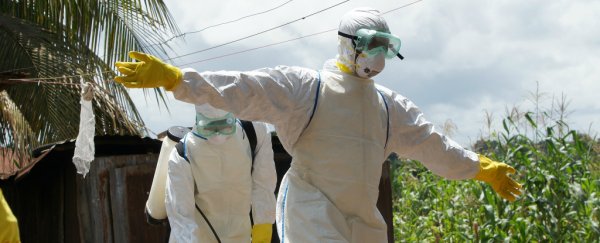When the developing world faces a terrifying outbreak, such as Zika virus or Ebola, the wealthiest countries of the world have gotten into the habit of rallying together and sending in their best scientists to develop new treatments and maybe even a vaccine, and effectively saving the day.
But all those best intentions might actually be doing more harm than good, according to a leading group of international researchers and global health officials who are working together to put an end to what they call "parachute research".
The argument here is that while helping out countries during a time of crisis sounds good, many scientists are simply swooping into developing countries, collecting specimens, and flying straight back out again so they can analyse them and hopefully come up with some Nobel-prize winning (or worse, money-making) solutions.
And not only do scientists often fail to coordinate with those fighting the epidemic in the country of origin - most of them don't share their discoveries for months, if at all.
"Sometimes it's because they want to publish their results - and medical journals prefer exclusives. And sometimes it's because they can make a lot of money by coming up with copyrighted treatments for the disease," writes Nurith Aizenman over at NPR.
But researchers and health officials are now working to change this, so that parachute research doesn't make it harder to stop the rapidly spreading Zika virus outbreak, like they say it did with the Ebola outbreak in West Africa in 2014.
Back then, as soon as word of the outbreak spread, a team of scientists quickly descended on Guinea and were rapidly able to sequence the genetic code of the first Ebola virus samples.
Those sequences were made public, but after that… nada, despite many other researchers flocking to West Africa to help. It's argued that this occurred because the scientists were waiting for their research to be published in prestigious journals.
"There were many months in which no new Ebola sequences came out," one of the scientists behind the campaign, Nathan Yozawiak from the Broad Institute and Harvard University, told NPR. "Those were the critical periods in which you were seeing the most cases across West Africa - and yet the fewest amount of sequence data."
It's somewhat understandable when many scientists have to publish their work in good journal to keep their jobs. But it could also come at the cost of thousands of lives.
To stop this happening again, the world's top public health organisations, researchers, and journals signed a pledge back in February that they would do everything in their power to get Zika research out "as rapidly and widely as possible".
The World Health Organisation (WHO) also issued a statement back in September, which "affirmed that timely and transparent pre-publication sharing of data and results during public health emergencies must become the global norm."
As a result, some country's research funding bodies have now forced scientists working on Zika to agree to make their data public immediately if they want to keep getting money for their research. And 11 top journal publishers have said they'll still publish Zika research, even if it's already gone out to the public.
"If you want really to have a rapid public health response you have to make sure that that data is available as soon as it's known," said David Heymann from the London School of Hygiene and Tropical Medicine, and the chair of the WHO's emergency committee on Zika. "And that means in the country."
But getting data our earlier doesn't solve one of the biggest problems of parachute research, which is that sometimes researchers go into a country, find solutions, and then sell them back to the country at an unaffordable price - something known as 'biopiracy'.
That's a little harder to fix - Heymann calls the whole thing "a real wicked problem" - but countries are also making moves to stop this happening. For example, Brazil is writing new policies against taking Zika samples outside the country, which arguably might not be the ideal solution, but is at least a step in the right direction.
The best news is that if we get some proper guidelines and policies in place to stop scientists from capitalising on outbreaks in developing countries now, it won't only speed up the fight against Zika, it'll also help save lives long into the future.
Hopefully that'll help scientists get back to what they do best - come up with solutions to real, global problems. Which, despite everyone's best intentions, have never been more desperately needed.
Find out more about the campaign against parachute research over at NPR.
